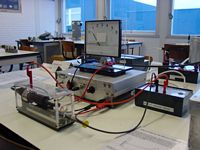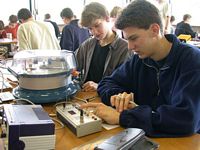English information
The Ionizing Radiation Laboratory (Dutch acronym: ISP) offers students in Dutch schools for secondary education the possibility of doing experiments with radioactive substances and X-ray sources related to topics in the examination programs such as the properties of ionizing radiation (ionizing and penetrating power), activity, half-life, absorption,half-value thickness and range. For that purpose, the ISP owns three mobile laboratory facilities with over twenty experiments. These experiments can be installed in a standard school laboratory for one day (or longer, if necessary). In addition, the ISP owns two comparable permanent laboratories with a regional function, located in the cities of Utrecht and Goes.
The ISP is an initiative of the Freudenthal Institute for Science and Mathematics Education at the University of Utrecht, currently supported by the Julius Institute at the Department of Physics and Astronomy.
The information about the ISP on the Dutch part of this website is summarized below. In case of further questions (and difficulties with reading Dutch), you can contact us in one of the following ways.
Telephone 030 253 1178 / 1181
E-mail science.isp@uu.nl
Postal address Princetonplein 5, 3584 CC Utrecht, The Netherlands
Visiting address Princetonplein 5, 3584 CC Utrecht, The Netherlands – Buys Ballot Building, room 3.01 and 3.69 / Minnaert-building, lab 004-006
Staff members
Dagmar Jongenelen
Jeroen de Meij
Laura van Leeuwen
Rob van Rijn (coordinator)
Rationale
The reasons for offering the ISP as a centralized facility for secondary schools are twofold. First of all, schools generally do not have the financial means to invest in the rather expensive radioactive and X-ray sources and measuring devices, and in the necessary permits and prescribed safety precautions. Secondly, without such a facility the teaching of the topic of ionizing radiation would be of a mainly theoretical nature, while the students’ hands-on experiences could positively influence their motivation and conceptual development concerning this socially relevant topic.
Target Population
The target population of the ISP consists of students in their final year of secondary education with physics as one of their school subjects. If our capacity permits, also students in their pre-final year and students of teacher education departments at colleges and universities as well as other vocational training institutes can use the ISP facilities.
Experiments
The ISP experiments are divided into four groups: five experiments about radioactive decay (dealing with the concept of half-life of radioactive substances), eight experiments about absorption of ionising radiation (dealing with concepts such as range, half-value thickness and absorption coefficient), four experiments about X-rays (among which the X-ray device, Bragg reflection and X-ray computed tomography) and a miscellaneous group of seven experiments (among which the statistical nature of radiation, back scattering, the Wilson chamber, the GM counter and gamma spectroscopy).
 |
 |
| Range of α particles in air | Bragg reflection |
Laboratory Session
During a standard laboratory session of about two hours, students perform three to five experiments – at least one out of each group. During such a session they are coached by the ISP staff member and their own teacher or the school’s laboratory technician.
Depending on the distance between Utrecht and the school it is possible to have two to three standard laboratory sessions during a day for sixty to ninety students.
Teaching Materials
The theory, aim and equipment set-up for each experiment and its practical applications are described in the booklet ISP Experiments with Radioactive Sources and X-Ray Devices. The students can use this information booklet for preparing themselves for the laboratory session, e.g. for choosing the experiments they would like to perform. During the laboratory session their work is guided by a worksheet indicating ways of data collection and processing. These worksheets are of a rather closed character, with detailed instructions for the students. Part of the experiments are also suitable for a more open approach, in which the students themselves, given the available equipment set-up, formulate the research question and accessory hypothesis, draw up their own plan of work for data collection and processing, and write a report. In this more open approach the students are guided by a more process-oriented worksheet.
On some of the worksheets students are advised to consult an additional information sheet, which is part of the equipment set-up during a laboratory session.
The ISP website offers teachers and students some background information about the character, effects and applications of ionising radiation.
All teaching materials, as well as the background information on the ISP website, are written in Dutch. The booklet ISP Experiments, the worksheets and the information sheets are also available in English for use at Dutch international or bilingual schools. The information booklet ISP Experiments, the worksheets (either for the closed or the more open approach) and the information sheets can be downloaded in pdf format by clicking on the links below.
Information Booklet
Ask for our information booklet through one of our staff members
Donwload Worksheets [closed experiments]
Download Worksheets [open experiments]
Information Sheets
1 Range of Alpha Particles in Air
5 Universal Range
6 Geiger-Müller Tube
Financing
The ISP is financed to a large extent by the Dutch Ministry of Education, Culture and Science supplemented with incidental contributions from the University of Utrecht. In addition, the Dutch schools for secondary education pay a fee of € 11 for each participating student with a minimum of € 330,- for a school visit by one of the mobile laboratories.

